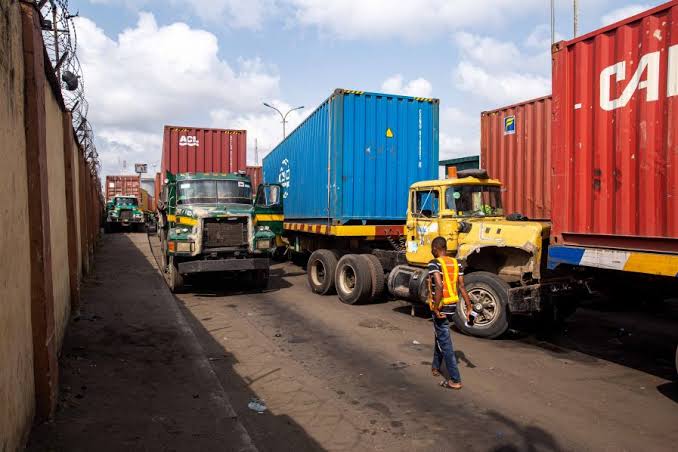Brace up if you live in Nigeria for more rise in cost of imported goods is coming in few weeks if nothing is done about the congestion at the Apapa Port.

In the bustling heart of Lagos, Apapa port serves as a gateway to the world.
Each day, ships laden with goods arrive, promising new opportunities for the Nigerian economy.
However, as more goods arrive each day, with many still waiting to be lifted, there is a growing congestion.
At the moment, this congestion and logistical challenges within the port is pushing imbalances in market supply and demand.
To remedy the situation the Association of Maritime Transport Owners (AMATO) suspended the release of cleared cargo.
Basically, this has been attributed to “inadequacies of terminal operators and low efficiency”. This is what Mr. Sani Mohammed from the Association of Maritime Transport Owners (AMATO), said in an official notice addressed to the trucking sector of the maritime industry, Truck Transit Parks (TTP).
Consequently, the temporary suspension of releasing cleared cargo is expected to affect many Nigerians.
In fact, this may lead to a hike in prices of goods, undermining the nation’s economy further.
The Tale Of A Trapped Container
At the moment small business owners are gradually running out of products, yet a lot of the products are trapped at the port.
A woman, Amina, who runs a grocery store reliant on imported goods such as rice and sugar, is finding it hard to access her imported goods.
The shelves in her sop are almost bare and with the holiday season approaching, she knows she must restock quickly.
While she waits for the goods to come in, demand is not slowing down.
If her goods don’t arrive soon, she risks losing customers to competitors.
Read More; TTP Suspends Truck Movements From Lilypond To Apapa Port In Response To Congestion Problems
The Ripple Effect Of Apapa Congestion
Meanwhile, Mr. Damilare, a food supplier, also faces similar challenge.
As Amina struggles, he is forced to raise his prices due to sourcing costs.
As prices increase, families’ grocery bills will rise, leading to difficult choices.
The situation at Apapa port will surely add impetus to the current situation in Nigeria, making families spend more on daily needs which would go up because of low supply.
In economics, as supply drops, price will go up. This situation reflects a larger issue affecting the Nigerian economy.
If the suspension persists, Nigerians can expect further price increases, and coming at the end of the year, it will heap more pain on the people.

